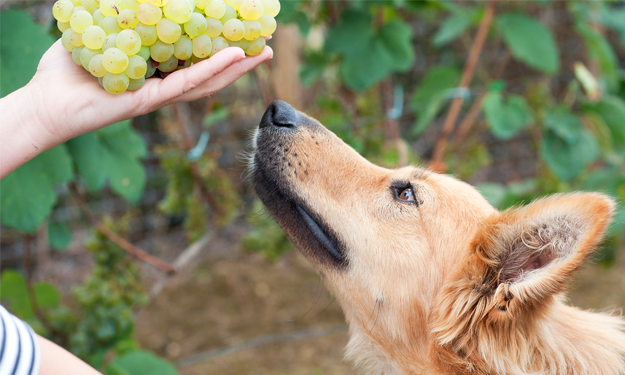The Danger of Grapes & Raisins to Dogs

While many of us enjoy sharing snacks with our canine friends, many human foods are toxic to dogs including grapes and raisins.
Why are grapes and raisins not toxic to all dogs?
At this time we do not know the exact toxic mechanism. The toxicity is idiosyncratic, meaning that there is no way to predict which dogs will be affected or not, and some dogs will experience toxicity from a small ingestion while others can ingest large amounts without any obvious problems. Even a small amount in a susceptible dog can be fatal. Dogs of any age, breed, or gender can be affected.
Possible serious symptoms
One of the most serious complications of grape and raisins is that they can cause severe kidney damage leading to acute kidney failure. Clinical signs can include vomiting, diarrhea, decreased appetite, lethargy, weakness, abdominal pain, oliguria (passing only small amounts of urine), or changes in urination or drinking pattern.
What to do if your dog ingests grapes or raisins
If you witness your dog ingesting grapes or raisins, it should be considered an emergency and veterinary evaluation should be sought out immediately.
You should consult a veterinarian by phone or call Poison Control if you are unable to seek veterinary attention so that vomiting can be induced in as safe a manner as possible.
Vomiting should be induced as soon as possible, before the toxins within the fruit can be absorbed. This should ideally be performed at a hospital under veterinary supervision, and absolutely should not be performed at home if your dog is having trouble breathing, showing any signs of distress, or is lethargic.
The next step in decontamination is typically administration of activated charcoal, which binds up any toxin left in the gastrointestinal tract. Baseline bloodwork and urine testing will be performed to assess for evidence of kidney damage, and kidney values should be checked daily for a few days since renal failure can take up to 72 hours to become apparent in some cases. Fluid therapy is the mainstay of treatment for grape or raisin toxicity and is typically recommended for 2-3 days.
Most cases of grape or raisin ingestion are diagnosed as a witnessed ingestion, but a veterinarian should still be consulted as soon as possible if partially digested grape or raisin bits are found in feces or vomit. The best treatment is prevention – keep raisins and grapes out of reach of your dog and notify family members of the toxic potential of these foods.
Written by Erica O’Donnell, DVM, MRCVS